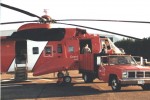
Some of you may wonder why the number of stories about re-supplying the lighthouses exceeds the others on this site by a large margin (lots more coming!). Next to the family and job, the arrival of the mail and groceries was the most important event in the life of the lightkeeping family.
Imagine no telephone, no television, no two-way radio, possibly no AM radio, and no contact with the outside world except what you saw going by your window. The post was and still is the most important contact to the real world.
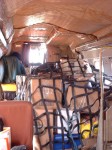
Next think of no refridgerators, no freezers, and on some stations, no room for a garden, probably no hunting, and fishing only if the weather is good and the tide not too strong.
In the early days (1920s – 1950s) food sometimes had to last for six months or more and could arrive damaged. In the early days the ships did not have freezers as well, so your fresh side of beef could now be many weeks old and growing green as the ship could not deliver because of bad weather, malfunctions or search and rescue. Even in my years on the lights (1969 – 2001) when we had monthly delivery, supplies would not arrive because the store did not have the item in stock and never thought to substitute another, or they would get soaked in the rain, or seawater.
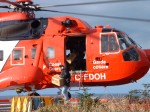
The expected parcel from the post office would not arrive because it had been delayed in the post office or by the shipper and missed the ship or helicopter for that month.
Imagine doing bank balancing with bank statements that were two months old and finding out also that the check you had mailed to the bank a month ago and were counting on for purchases had not made it there yet.
No wonder we started shopping for Christmas in August!

If one ordered a part for the washing machine that had broken (say on the February tender), it was sent out on one helicopter or ship and made its way through the post to the supplier, who either had or had not the part. Usually the reply (good or bad) did not make the next tender a month later (this would be March – see next paragraph), so you waited until the third tender (April) and hoped that the part fit.
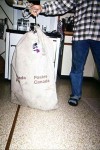
Our mail did not go immediately to the Post Office after leaving the lighthouse. Imagine your request leaves the lighthouse, using the above February example, on the 15th. The next supply trip is going to be March 15th. Meanwhile the ship has left your station heading for another. The normal supply trip around Vancouver Island could take over a week! If it was a re-fuelling run, then even longer. Once at the Coast Guard base it had to be unloaded, delivered to the Stores Manager where it was sorted as to Post Office mail, personal mail, office mail, etc. Then it had to be delivered to the Post Office and from there into the system.
This could now be at least February 22nd and usually later. (now only two weeks to get a reply back before the March 15th tender). If the supplier had or had not the part he had no way of contacting you except by the reverse route (Post, Coast Guard, ship, lighthouse) so there was the bind.
One got used to it but if you were waiting for that special birthday gift, it sure could cause a lot of problems.
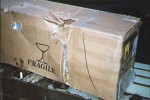
With the advent of a radio telephone shared by all lighthouses, it became possible to shorten the time of arrival of necessary parts, amend grocery lists and generally join the real world. Well, almost!
This telephone link was usually shared by as many as five to ten lighthouses for such things as lighthouse to Coast Guard weather pickups, special weather messages, messages to the office (remember up to 10 lighthouses), messages from the office (to one or all ten), Search and Rescue queries or help, medical emergencies or calls to the doctor, and, if there was time, sometimes a personal phone call to town or another lighthouse.
Now remember, this was over a radiotelephone link that could be heard by anybody that had a scanner in town or on a boat, or anybody picking up the phone and listening, and was subject to so many malfunctions (especially in winter) that it became a joke, but it was better than nothing and of course lighthouse keepers had plenty of time on their hands (old rumour!).
So, please excuse me if I give precedence to the one factor in our lives that kept us sane – the mail and the food delivery.
As a closing, I must give credit to Coast Guard stores personnel, the helicopter pilots and ship’s captains and crews, and also the Canadian Post Office in Prince Rupert and Victoria, BC. They all were wonderful, and many times went out of their way to help us out in any way they could. Thanks!